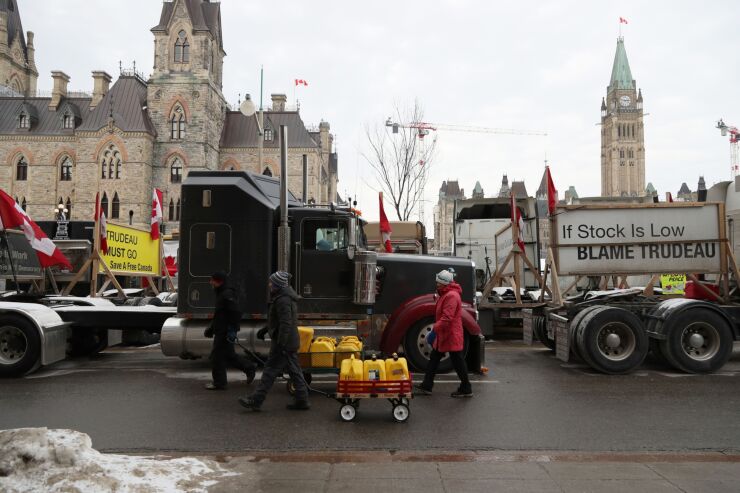Canada’s national police service is sending to banks the names of people involved in protests that have paralyzed the nation’s capital, a first concrete step in the financial crackdown on demonstrators.
The Canadian Bankers Association confirmed the Royal Canadian Mounted Police has provided a list to the banks. The banks are still seeking clarity from law enforcement on how to handle the alleged protesters’ accounts, according to people familiar with the matter. But Finance Minister Chrystia Freeland said some accounts have already been frozen.
Prime Minister Justin Trudeau’s government invoked an emergency law on Monday to try to end protests that have occupied the streets of Ottawa for nearly three weeks and resulted in the closing of border crossings.
The

If they find such a person in their customer list, they must freeze their accounts and report it to the RCMP or Canada’s intelligence service, the regulations say. Any suspicious transactions must also be reported to the country’s anti-money-laundering agency, known as Fintrac.
Asked about freezing accounts and other financial restrictions, Freeland said: “It is happening — I do have the numbers in front of me.” But she declined at a news conference to say how many people or accounts have been caught in the dragnet so far.
Trudeau formally kicked off parliamentary debate on his use of emergency powers Thursday, saying the situation “could not be dealt with under any other law in Canada.”
He said the blockades are “a threat to our economy and relationship with trading partners. They’re threats to supply chains and the availability of essential goods like food and medicine. They’re a threat to public safety.”
But the Conservatives accused Trudeau of resorting too quickly to emergency powers and of freezing bank accounts without evidence of extremist activity.
“Throughout the last three weeks, the prime minister has failed to take meaningful action to deescalate the protest here or use any tools that he may have available,” Conservative Leader Candice Bergen said. “Instead, he has jumped straight to the most extreme measure.”
Noa Mendelsohn Aviv, executive director of the Canadian Civil Liberties Association, said the emergency orders on the financial system are remarkably broad and could encompass people providing almost any help to the hundreds of protesters.
“If somebody else does agree with it and wants to bring coffee to the protesters, are they now indirectly involved? And you can turn their information over to the financial institutions who will turn their information over to the security services" and freeze their assets? Mendelsohn Aviv said in an interview. “There is nothing that I’ve seen so far on my understanding of the orders that limits it. They are very broad in scope.”
While Trudeau spoke on Thursday, a much stronger police presence began patrolling the streets in the parliamentary precinct.
For a second consecutive day, Ottawa police have handed out flyers warning of criminal charges and vehicle seizures for anyone who doesn’t leave the protest zone, which has been declared a prohibited public assembly under the emergency legislation. Police also erected tall fencing around government buildings.





